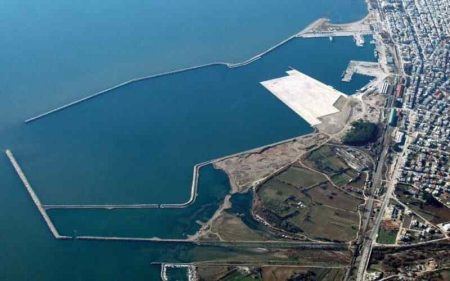The Prime Minister Alexis Tsipras estimated that his government and partners have entered the final stretch towards a mutually-beneficial agreement, in the speech he gave at the annual general meeting of the Hellenic Federation of Enterprises (SEV). As he stressed, the main conditions for an agreement are low primary surpluses for 2015 and 2016, a growth package that will help reboot the economy and no further wage and pension cuts. Such an agreement would provide the necessary momentum to help the Greek economy grow, he added.
In his speech he described his government’s “major struggle” to convince its partners that “the previous situation was not sustainable and it would economically absurd and socially catastrophic to carry on«. The Prime Minister explained that Greece is honestly working and dedicated towards an agreement, as evident by the payments of 8 billion euros in obligations since his government was elected. Mr. Tsipras noted that while his government has kept its promises, the same cannot be said about all other parties involved in the negotiations and commented that there were “divisive plans for the future of Europe” circulating, but he estimated that rationality has prevailed.
Mr. Tsipras underlined that “we are prepared to compromise”, provided that the agreement does not merely provide short-term relief, but rather provides a mid-term solution to the country’s financing problem, until it can return to the market, while in the long-term will reduce the public debt. He argued that past few months of negotiations have been hard, but the foundations have been set for “a leap forward”, despite the adversities.
Later, he explained that the bailout’s growth model of deregulating the job market and slashing wages did not only fail to achieve its goals, but rather it stifled growth. As such, a national growth plan must aim towards social cohesion and benefiting the greater possible number of people. Social justice is paramount in providing a long-term and sustainable growth rate.
According to PM Tsipras, efforts must be made to support domestic demand, rather than focusing just on exports. The country’s competitive advantages, such the work force, natural resources and geopolitical position must also be supported. The ‘braid drain’ trend can be reverse by respecting labor rights and supporting employee rights. Finally, the government must support enterprises that promote innovation and quality.
Following the conclusion of the negotiations, Mr. Tsipras vowed to shift his focus on tackling the major problems affecting public administration, hinting towards a major reform. He spoke of designing new bodies that will play an advisory role, the simplification of the tax system (in order to improve VAT collection, combat tax evasion and provide a stable environment that will attract investments) and combating corruption.
The Prime Minister explained that the Greek economy cannot rely ad infinitum on financing from abroad and detailed his plans regarding the foundation of a national growth bank. This bank would collect and take advantage of domestic and European funding. At first this bank would support agricultural development and infrastructures outside of urban center, with investments in services and helping SMEs grow being a secondary goal.
Regarding alternative financing sources, the PM referred to the European Bank for Reconstruction and Development’s intention to invest 500 million euros in Greece in 2015. Further options include the Juncker package and the offer to participate in the BRICS growth bank. Mr. Tsipras concluded that a solution would soon be provided for bad loans and that a solution is being sought out for business loans.





